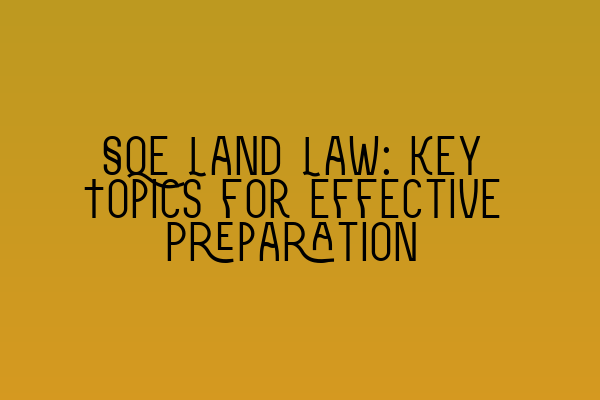SQE Land Law: Key Topics for Effective Preparation
Are you preparing for the Solicitors Qualifying Examination (SQE) in Property Law and Land Law? As a prospective solicitor, it is crucial to have a solid understanding of the key topics in land law to excel in your exams and succeed in your legal career. At SQE Property Law & Land Law, we are here to guide you through the essential topics and provide you with the knowledge and skills you need to excel in your exams and beyond.
Understanding the Basics
Before delving into the specific topics, it’s important to grasp the fundamental principles of land law. Land law governs the rights and interests in land and plays a crucial role in the legal system. It ensures property transactions are conducted legally and protects the rights of property owners. Familiarize yourself with concepts such as property ownership, estates, and legal interests in land.
To further strengthen your understanding, take a look at our article on Understanding Contractual Capacity: Rights and Limitations to explore the connection between land law and contractual capacity.
Free Resources for SQE Land Law
At SQE Property Law & Land Law, we recognize the importance of interactive learning and self-assessment. That’s why we offer interactive SQE mock tests specifically designed to test your knowledge in land law. These tests cover a wide range of topics and provide detailed explanations, helping you identify areas that may require further attention.
In addition to mock tests, we also offer SQE Contract Law webinars where our experts provide valuable insights and guidance on land law. These webinars are an excellent opportunity to deepen your understanding and clarify any doubts you may have.
Key Topics in SQE Land Law
Now let’s explore some of the key topics you should focus on when preparing for the SQE Land Law exam.
1. Registered and Unregistered Land
Understanding the difference between registered and unregistered land is essential in land law. Registered land is governed by the Land Registration Act 2002 and involves a formal registration process with the Land Registry. On the other hand, unregistered land follows the principles of common law and relies on deeds and historical documents to establish ownership and interests. Familiarize yourself with the advantages and limitations of each system.
2. Co-Ownership and Trusts
Co-ownership refers to when two or more individuals jointly own a property. It’s crucial to have a thorough understanding of the legal implications of co-ownership, including the rights and responsibilities of each co-owner and the different types of co-ownership, such as joint tenancy and tenancy in common. Additionally, delve into the topic of trusts, particularly resulting trusts and constructive trusts, as they often arise in co-ownership scenarios.
3. Leases and Tenancies
Leases and tenancies form the basis of landlord-tenant relationships. Understanding the essential elements of a lease, such as duration, rent, and covenants, is crucial to advising clients and drafting effective lease agreements. Additionally, explore the rights and obligations of both landlords and tenants, eviction procedures, and the role of leasehold covenants.
Stay Up-to-Date with Reforms
As a legal professional, staying informed about recent changes and reforms is essential. Familiarize yourself with any recent changes in land law, such as alterations in legislation or significant court decisions. Learn more about recent reforms by reading our article on Contract Law Reforms: An Analysis of Recent Changes.
Rights and Responsibilities of Parties
Understanding the rights and responsibilities of parties involved in land transactions is crucial for providing effective legal advice. Gain insight into the rights and obligations of buyers, sellers, tenants, landlords, and mortgagees. Explore the role of contracts and the relevant statutory provisions to ensure you have a comprehensive understanding of the legal landscape.
To dive deeper into the topic of parties in a contract, read our article on Parties in a Contract: Rights and Responsibilities.
Summary
Preparing for the SQE Land Law exam requires a solid understanding of fundamental principles and key topics in land law. By familiarizing yourself with registered and unregistered land, co-ownership and trusts, leases and tenancies, recent reforms, and the rights and responsibilities of parties, you will be well-equipped to excel in your exams and develop a successful career in property law. At SQE Property Law & Land Law, we are committed to providing you with the resources and guidance you need to succeed. Take advantage of our interactive mock tests, webinars, and free articles to enhance your preparation.
